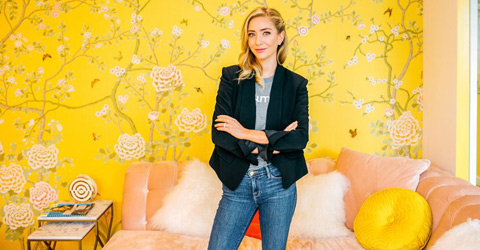Whitney Wolfe Herd is well-known for her bold decisions and stance, and it has reflected in her business ideas as well. She started the dating app Bumble, where women get to make the first move over conventional male-dominated dating culture. The 31-year-old also recently became the world’s youngest self-made female billionaire when she took Bumble public in February 2021.
Herd attended college at the Southern Methodist University, where she majored in international studies and was a Kappa Kappa Gamma sorority member. While still in college, she was always passionate about helping people and decided to start a business selling bamboo tote bags to help areas affected by the oil spill of BP. She partnered with celebrity stylist Patrick Aufdenkamp and launched the non-profit organization named the ‘Help Us Project.’ The bags were a hit and received national press after celebrities such as Rachel Zoe and Nicole Richie were photographed. Shortly after that, she began working on a second business with Aufdenkamp called ‘Tender Heart’, a clothing line dedicated to raising awareness around human trafficking and fair trade. After graduating, Herd travelled to Southeast Asia, where she worked with orphanages and helped in any way that she could. Herd Said, “I knew I was ambitious, I knew I was passionate, and that I wanted to change the world in some shape or form, but I had no idea what that might look like.”
At age 22, Herd joined Hatch Labs. Through the company, she got involved with the startup Cardify. Sean Rad led the project through Hatch Labs IAC incubator; however, the project was later abandoned. By then, Herd has the opportunity to join the development team for the dating app Tinder with Rad and Chris Gulczynski within the IAC startup incubator in 2012.
Due to her excellent marketing skills, she soon found herself named the Vice President of Marketing for the dating app Tinder. Tinder was an instant hit not just in the US but around the globe. She was also reportedly the mastermind behind the name of the app, taking inspiration from the flame logo and the idea of Tinder, which is a combustible material used to start a fire. She was also credited with fueling its popularity on college campuses and growing its user base.
Before founding Bumble, Herd was not just the VP of Marketing but also among Tinder’s founding team. However, due to tensions with other executives – especially one of whom she had been dating previously – she left the organization. Shortly after, she filed a sexual harassment case against the company.
Match Group Inc, Tinder’s parent company, denied her claims but paid around $1m to settle the dispute. As a result of the case and her allegations, she experienced online abuse that even prompted her to delete her Twitter account.
Wolf Herd said in an interview, “I’ve been in a place in my life where I’ve had no confidence, no self-respect, zero self-worth and it was really easy to hurt my feelings. Then when you rebuild some of that, you become stronger.”
That’s when Bumble was born in 2014. The misogyny of tech–is precisely why Bumble was invented. It’s also why Herd designed the app so only women can send the first message when users match on the platform. In an online dating landscape where women–particularly women of colour–are routinely harassed and bullied, she set out to build the closest thing to a safe space for digital romance. “Honestly, my ambition comes from abusive relationships,” Herd said. “I’ve never had this healthy male relationship until I created it. I engineered an ecosystem of healthy male relationships in my life.”
She founded the app, Bumble with help from early investor Andrey Adreev, a Russian billionaire who has a stake in Badoo and sold both in November 2019.
Herd currently owns an 11.6% stake in dating app, Bumble, which gives her an estimated net worth of $1.3bn while she also heads Badoo. The two apps have a combined 40 million users, 2.4 million of whom pay a subscription.
Wolf herd has always been open about her mental healths battles and says she is still trying to figure it out with a therapist and her favourite meditation app, Headspace. Herd feels as the CEO of Bumble, it is her responsibility to talk about these mental health challenges and influence her audience in a positive light. She said, “I do [feel a responsibility to be open]. I like being honest and I know how bad it made me feel when I was going through dark times and I would read about all these ‘boss girls’ and successful tech people. They sounded so perfect and I thought, This will never be me because I have all these problems. I think it’s healthy and important [to be open and honest]. We have an audience of 22 to 23 millions users now – that’s a lot of people and as the CEO, it’s my responsibility to ensure that both my team and our users feel healthy and happy.”
The brand of Bumble is deeply embedded in the Empowerment Industrial Complex. “I think empowerment has probably commercially been taken advantage of, the word itself, and we’re probably part of that,” Wolfe Herd said. “We started saying this before Time’s Up, before #MeToo–we were saying these things before our peers. Every single company right now is doing ‘girl power’ and ‘the future is female.'” Herd knows that keeping her brand relevant means expanding her vision for the company beyond the women she imagined when launching the app. And, of course, she knows how to brand this too. In conclusion, Herd said, “I’m so happy to own our shortcomings because that’s the only way we’re ever going to get better.”







